Wat Ratchanatdaram
Wat Ratchanatdaram (Thai: วัดราชนัดดาราม, pronounced [wát râːt.t͡ɕʰā.nát.dāːrāːm]) is a Buddhist temple (wat) located at the intersection between Ratchadamnoen Klang and Maha Chai Road, in Phra Nakhon district, Bangkok. Meaning Temple of the Royal Niece, the temple was built to the order of King Nangklao (Rama III) for his granddaughter, Princess Somanass Waddhanawathy in 1846. It is popularly known as Loha Prasat, literally meaning the iron palace.[1][2]
| Wat Ratchanatdaram | |
|---|---|
 Loha Prasat | |
| Religion | |
| Affiliation | Buddhism |
| Status | Active |
| Location | |
| Country | Thailand |
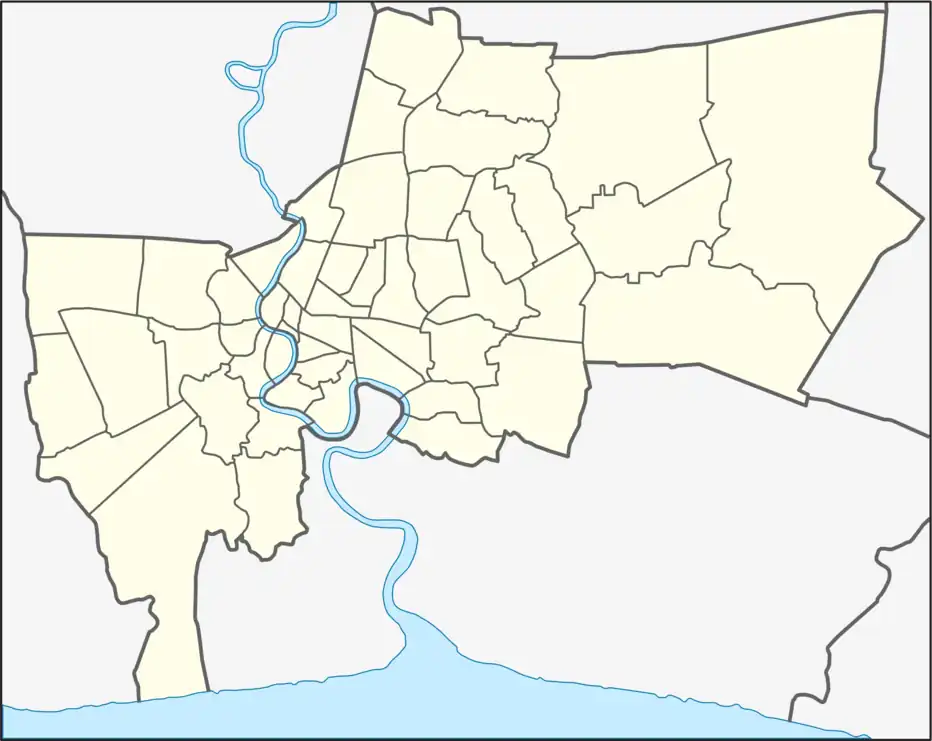 Shown within Bangkok | |
| Geographic coordinates | 13.755616°N 100.503930°E |
| Architecture | |
| Founder | King Nangklao (Rama III) |
| Completed | 2007 |
Etymology
The name loha prasat, literally means iron palace. The 37 spires of the temple have a metallic finish giving the entire structure a metal like look and hence the name. The 37 spires represent the 37 Bodhipakkhiya Dharma in Buddhism.[1][2]
History
Although the structure was conceived in 1846 during the reign of King (Rama III) it was not completed during his reign. Several attempts were made by King Rama III's successor to complete it but it was never successful. It was only in 1960 under Rama IX construction was restarted. It was supervised by the Fine Arts Department of Thailand. In 1995 a Buddha relic was enshrined at the topmost spire of the Loha Parsat. In 2007 it was opened to public.[1][3]
Architecture
Loha Prasat (โลหะปราสาท), which means iron castle or iron monastery. The 36-meter-high (118 ft) structure is composed of seven stories divided into three levels. The bottom one has 24 spires, the middle one 12 and the top level has 1 spire. The top most spire houses the Buddha relic.
A pyramid like structure created by the outer building is the widest, The next one smaller than the previous one. At the ground floor level of the tower you will find a labyrinth environment was supported by a great number of columns. Plenty of pictures are describing the history of structure in some of the corridors were installed in late 2007.
The Loha Prasat at Wat Ratchanatdaram is based on an old Buddhist design and is modelled after two earlier similar structures in Shravasti, India and Anuradhapura, Sri Lanka, both of which no longer exist. The Indian Loha Prasat contained 1,000 rooms with a golden spire on top. The Sri Lankan Loha Prasat had nine floors and the roof was thatched with copper. Precious stones, wood and ivory decorated the walls. Both the structures in India and Sri Lanka have collapsed giving the Laoha Prasat an unique identity.[1]
Gallery
References
- Datta, Rangan (6 November 2022). "A visit to Loha Prasat in Bangkok will fill you with peace, joy and serenity". No. The Telegraph. My Kolkata. Retrieved 31 August 2023.
- "Wat Ratchanatdaram Worawihan (Loha Prasat)". Amazing Thailand. Tourism Thailand. Retrieved 31 August 2023.
- "Loha Prasat". Thailand Magazine. Retrieved 31 August 2023.
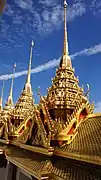
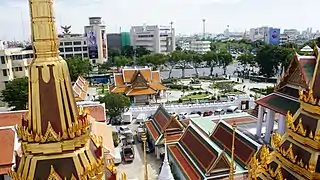
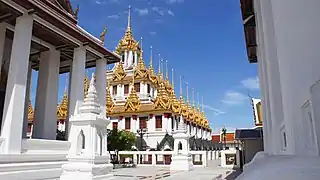
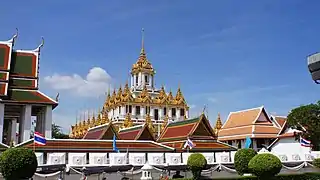
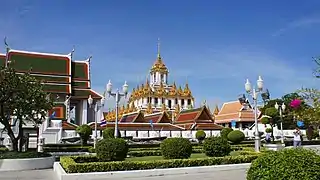

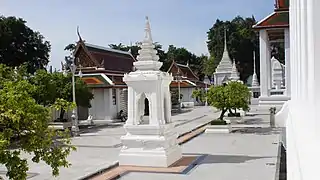
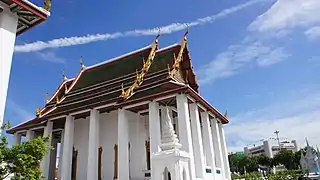
_%E0%B8%A7%E0%B8%B1%E0%B8%94%E0%B8%A3%E0%B8%B2%E0%B8%8A%E0%B8%99%E0%B8%B1%E0%B8%94%E0%B8%94%E0%B8%B2%E0%B8%A3%E0%B8%B2%E0%B8%A1%E0%B8%A7%E0%B8%A3%E0%B8%A7%E0%B8%B4%E0%B8%AB%E0%B8%B2%E0%B8%A3_%E0%B9%80%E0%B8%82%E0%B8%95%E0%B8%9E%E0%B8%A3%E0%B8%B0%E0%B8%99%E0%B8%84%E0%B8%A3_%E0%B8%81%E0%B8%A3%E0%B8%B8%E0%B8%87%E0%B9%80%E0%B8%97%E0%B8%9E%E0%B8%A1%E0%B8%AB%E0%B8%B2%E0%B8%99%E0%B8%84%E0%B8%A3_(2).jpg.webp)